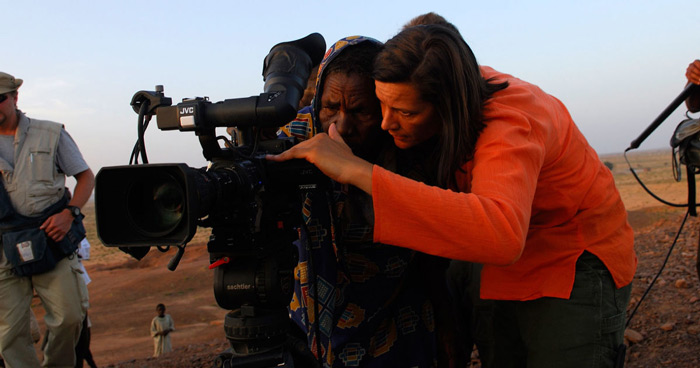Watching Cameraperson, the latest film by Academy Award-winning documentary cinematographer Kirsten Johnson, feels more like a slow walk through an art exhibit than a film. Cameraperson consists only of clips from past documentaries labeled by the location in which they were shot—the film thus remains opaque to the viewer for most of its 1 hour 40 minute runtime. But in a single moment, the narrative clicks together and reveals itself as a meditation on a lifetime spent observing through the eyes of a camera.
At it’s core, Cameraperson is an attempt to reconcile the documentation of trauma with the memories surrounding it. The bulk of the films Johnson has worked on deal with trauma and death. Through her work, Johnson has collected the stories of victims of war crimes, rape, racially motivated murder, poverty, and terrorism. The film shows us scenes from across the world, such as a victim of a rocket strike in Afghanistan, a survivor of rape during the Bosnian civil war, and an African-American woman speaking about her decision to terminate a pregnancy.
Often, we view remembrance as honouring—but remembering can renew trauma that victims may have long-struggled to move past. How does a filmmaker proceed with the work of preserving memories, when memories themselves can be traumatic? This question becomes poignantly relevant when the matriarch of a Bosnian family is pressed on her experiences during the war. The woman vehemently denies that anything happened to her family. She remains defiant until she’s asked instead about her style of dress, and her face brightens up. The woman doesn’t tell us about the war, but through this exchange the viewer witnesses one of many coping mechanisms deployed in response to the lasting effects of trauma.
Johnson’s choices of what to include in her film are also a method of coping with the trauma she has witnessed. After a difficult birth in an under-equipped Nigerian hospital, a midwife remarks that the infant needs oxygen—which the hospital doesn’t have. Although the scene ends with the door closing, shutting the viewer out of the outcome, Johnson and her crew did not have the luxury of ambiguity. By excluding a possibly-tragic outcome, Johnson’s construction of that narrative is evidence of the documentary genre’s ability to manipulate narratives. Cameraperson is an exploration into when to forget and when to remember—and how filmmakers can control what is entered into collective memory through editorial omissions.
The play between remembering and forgetting, and showing and hiding, is central to this film. In one scene, a speaker from the “Syrian Dissident Film Collective,” tells his audience that when the media focuses on violence, it can remove the dignity of the victims. In Susan Sontag’s book Regarding the Pain of Others, a rumination on the effect of wartime photography, Sontag argued, “the only people with the right to look at images of suffering of this extreme order are those who could do something to alleviate it.” One of the questions implicit in a film about documentary filmmaking is that of whether the viewer has any power to affect change in response to the trauma they witness. If empathy is not a tool for change, documentary films collapse into voyeurism or hollow sympathy.
Cameraperson captures the uncomfortable pairing of tragedy and beauty. The film moves throughout history and across the globe, but the most personal moments for Johnson are the clips of her mother, who is slowly succumbing to Alzheimer's. Perhaps her mother’s loss of memory is a harrowing metaphor for documentary filmmaking in the face of the passage of time: No matter how hard we try to preserve stories for the future, the impermanence of all things prevails.
Cinema Political Concordia will be screening the Montreal premiere of Cameraperson with the director in attendance on Monday March 27 at 7:00 p.m. Admission is on a by donation basis ($5-10 suggested). The venue is wheelchair accessible.








